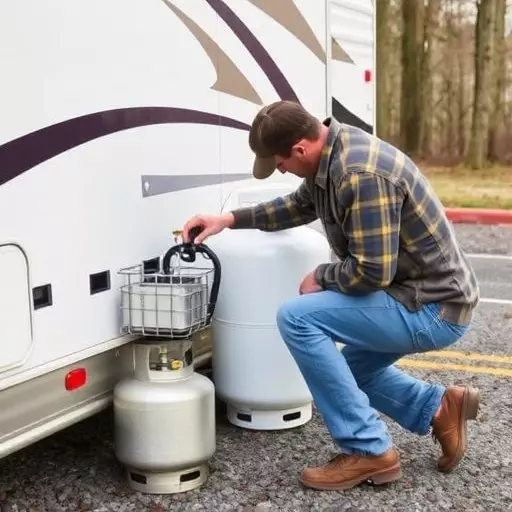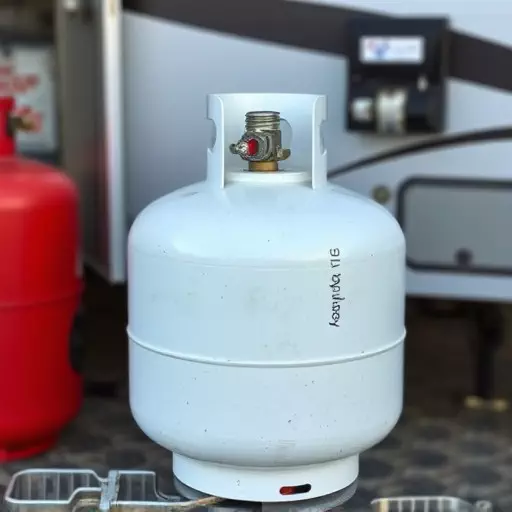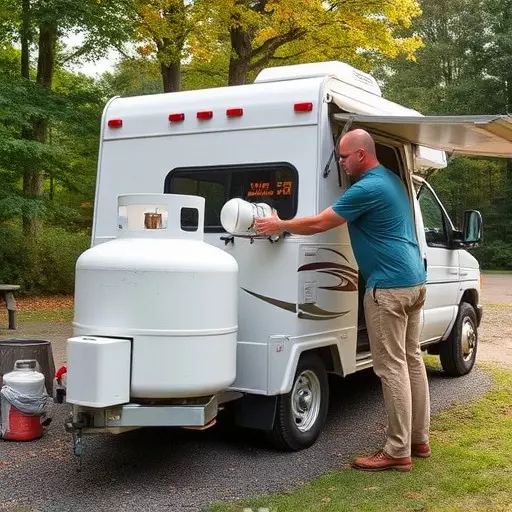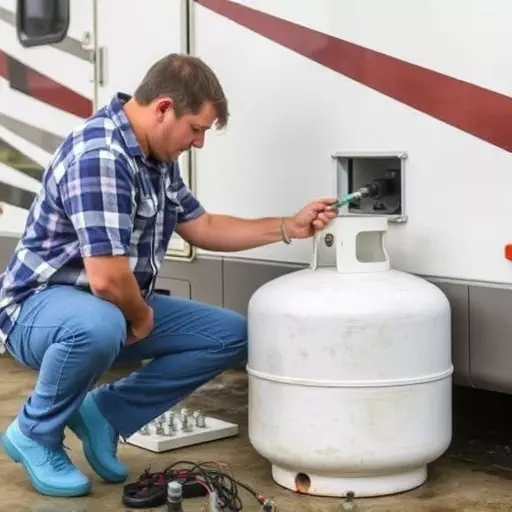Safe propane usage in RVs in Camden, New Jersey, involves a multi-faceted approach. This includes regular inspections of tanks and lines for damage or leaks, adhering to maintenance schedules, proper storage, and understanding emergency shutdown procedures. By following these guidelines, including annual professional inspections, RV owners can ensure security, efficiency, and compliance with local regulations, allowing them to safely enjoy their travels in Camden’s vibrant landscape.
In today’s popular RV lifestyle, efficient and safe propane usage is paramount. Propane, a versatile fuel source, powers essential appliances in these mobile homes. However, understanding its intricacies, from tank inspections to optimal utilization, is crucial for a safe and enjoyable journey. This article explores the critical aspects of monitoring propane efficiency in recreational vehicles, including safety guidelines, regular tank checks, efficient usage components, and local regulations in Camden, New Jersey, ensuring folks can navigate with peace of mind.
- Understanding Propane Safety in Recreational Vehicles
- The Importance of Regular Propane Tank Inspection
- Key Components to Monitor for Efficient Propane Usage
- Best Practices for Safe Propane Usage in RVs
- Local Regulations and Guidelines in Camden, New Jersey
Understanding Propane Safety in Recreational Vehicles

Safe propane usage is a top priority for any owner of a recreational vehicle (RV) in Camden, New Jersey or beyond. Before hitting the road, it’s crucial to understand the propane safety guidelines specific to RVs. This includes thoroughly inspecting propane tanks and lines for any signs of damage, corrosion, or leaks before each trip. Regular inspections not only ensure safe propane usage but also help prevent potential hazards like gas buildup and explosions. Following recommended maintenance schedules, keeping propane levels within optimal ranges, and understanding the proper storage practices are all essential components of responsible RV propane safety.
Beyond these basic precautions, familiarizing yourself with your RV’s propane system, including knowing how to shut off the supply in case of an emergency, is vital. Staying informed about local regulations and guidelines regarding propane tank transportation and disposal will also contribute to safe propane usage for recreational vehicles. By prioritizing these propane safety measures, RV owners can enjoy their travels with peace of mind, ensuring both a secure journey and efficient use of this valuable resource.
The Importance of Regular Propane Tank Inspection

Regular inspection of your propane tank is a crucial step in ensuring safe propane usage for recreational vehicles (RVs) like those in Camden, New Jersey. Before each trip or at regular intervals, it’s important to check the tank and its components for any signs of damage, corrosion, or leaks. Propane tanks are pressurized vessels that can degrade over time due to exposure to varying weather conditions, road debris, and frequent use. An annual inspection by a certified professional is recommended to assess the tank’s overall condition and ensure it meets safety standards.
By inspecting your propane tank, you can identify potential hazards early on, such as cracks or weakened seals that could lead to dangerous situations while you’re on the road. Following proper propane safety guidelines for RVs will not only protect you and your fellow travelers but also help maintain the efficiency of your heating, cooking, and other propane-powered appliances. This simple yet vital step can save you from unexpected issues and ensure a more enjoyable and secure RVing experience.
Key Components to Monitor for Efficient Propane Usage

When it comes to monitoring propane usage efficiency in RVs, understanding and regularly inspecting key components are essential for safe propane usage. Camden, New Jersey, residents and RV enthusiasts should adhere to stringent propane safety guidelines tailored for recreational vehicles. Begin by meticulously examining your propane tanks before each use; ensure they’re free from corrosion, leaks, or any signs of damage. Regular maintenance and prompt repairs are vital to prevent accidental releases that could lead to dangerous situations.
Additionally, pay close attention to your RV’s appliances, such as water heaters, furnaces, and stoves. Verify proper installation, regular cleaning, and optimal operation settings. Leaks in these systems can significantly impact propane consumption. Keep an eye on pressure regulators too; they maintain the appropriate gas pressure for safe and efficient usage. Regularly testing and calibrating these components will not only enhance propane safety but also ensure your RV operates at its highest efficiency while camping or exploring new places.
Best Practices for Safe Propane Usage in RVs

When it comes to safe propane usage for recreational vehicles (RVs) in Camden, New Jersey, or anywhere else, following best practices is paramount. Before every trip, inspect your propane tanks meticulously. Look for any signs of damage, corrosion, or leaks. Ensure all connections are secure and in good condition. Regularly checking these aspects can prevent accidents and ensure optimal gas utilization.
Propane safety guidelines for RVs involve understanding the unique challenges of using this fuel source while on the road. Always keep a close eye on propane levels, avoiding overfilling to reduce the risk of spillage or explosion. Store spare tanks properly, keeping them secure and well-ventilated. In case of any unusual sounds or odors, immediately stop usage and evacuate the area. Familiarize yourself with local regulations regarding propane tank disposal and recycling, contributing to a safer RVing experience in Camden and beyond.
Local Regulations and Guidelines in Camden, New Jersey

In Camden, New Jersey, local regulations and guidelines play a vital role in ensuring safe propane usage for recreational vehicles (RVs). The city’s Department of Public Safety has specific rules governing the installation, maintenance, and inspection of propane systems to prevent accidents and ensure efficiency. Before using or installing a propane tank in your RV, it’s crucial to familiarize yourself with these standards, which often require regular inspections by certified professionals. This includes checking for leaks, ensuring proper ventilation, and confirming that tanks are in good working condition to prevent potential hazards.
The safety guidelines for propane systems in RVs focus on preventing gas buildup, electrical fires, and explosions. By following these regulations, residents and visitors alike can enjoy their time exploring New Jersey’s vibrant landscape while maintaining the highest standards of propane safety. Inspecting propane tanks before each use is a critical step in this process, as it allows for prompt identification and resolution of any issues that could compromise efficiency or safety.


